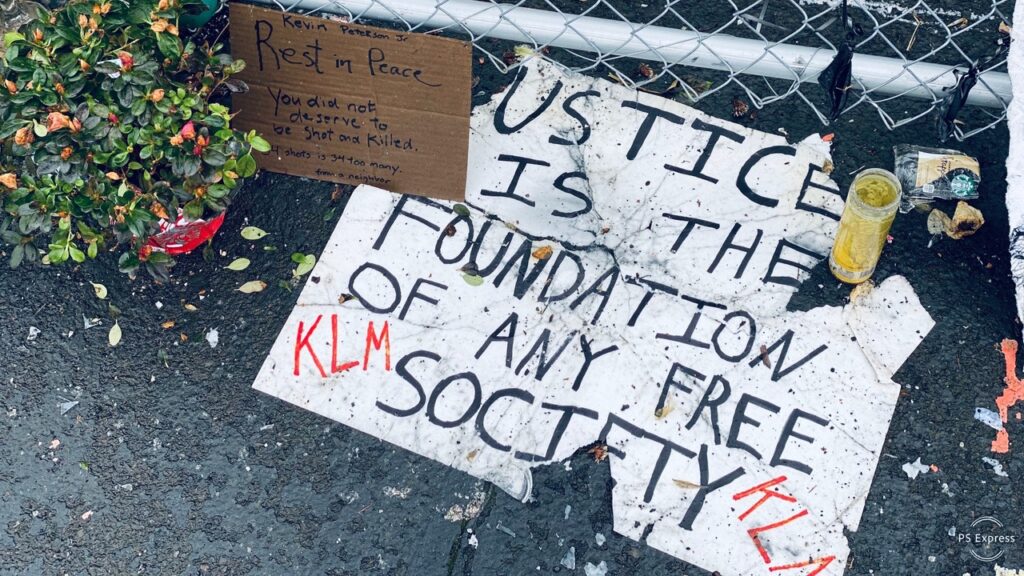Third Shooting is a Pattern

In 15 months Clark County Sheriff’s deputies wrongfully shot and killed three people, including an off-duty police officer.
One wrongful killing is a tragedy. Three wrongful killings is a pattern that needs fixing.
I’ve filed two wrongful death lawsuits against Clark County in two different officer-involved shootings. There are some disturbing similarities in the cases.
Wrongful Death Lawsuits
On October 29, 2020, Kevin Peterson Jr. was shot and killed by Clark County Sheriff’s Deputies as he ran away from a drug sting operation. On February 4, 2021, Clark County Sheriff’s Deputies shot and killed an unarmed motorist, Jenoah Donald, after an illegal pre-textual stop.
Then, in January of 2022, one of the deputies who needlessly shot at Kevin Peterson shot and killed an off-duty Vancouver Police Officer, apparently mistaking him for a criminal suspect.
Accumulating evidence shows, as I wrote in the lawsuits, “Clark County has a policy, custom, and established practice of failing to supervise and train its officers to use deadly force only as a last resort.”
There have been numerous protests and local and national media attention concerning the Clark County Sheriff’s Department’s unwarranted use of deadly force.
Family members spoke with KGW and other media outlets about their heartbreak.
Kevin Peterson Jr.
Like his father, Kevin Peterson Jr. played football for Union High School in Vancouver, Clark County. At the time of his death, he was a 21 years old. He was a popular kid with no criminal record.
Clark County Sheriff’s Deputies set up a sting to arrest Kevin for allegedly agreeing to sell 50 Xanax pills to an informant. Deputies set up the potentially dangerous operation in the parking lot of a Quality Inn on or about October 29, 2020, during peak traffic hours of 5:00 and 6:00 pm. Amazingly, deputies did not have the permission of the open business to use their property. Additionally, deputies did not take steps to insure the safety of the surrounding public.
At some point, Kevin realized he had been set up. His car was blocked in by deputies. He opened his door and ran. In his pockets were a cell phone and a gun. Something fell out of his pocket, but he picked it back up and kept running.
He did not say or do anything threatening to surrounding deputies. The deputies did not attempt to tackle or shoot him.
After running out of the Quality Inn parking lot, Kevin cut through some property, and then crossed into a U.S. Bank parking lot. Though the bank branch was closed, he was picked up on surveillance video. He can be seen on video walking with a cell phone as he FaceTimes his girlfriend Olivia.
She could tell he was scared and panicked. He was still trying to evade the deputies. Suddenly he spotted deputies arriving in front of him. He turned and ran.
“They’re shooting at me,” he told Olivia.
Hit by shots from behind, he fell. He sat up on the concrete and pointed his cellphone in the direction of the officers to show Olivia what was happening. There was another volley of shots. He went back down.
Deputies fired 34 rounds in two volleys. Three rounds hit Kevin as he was running away. One hit him in the chest when he sat up. He died at the scene from the gunshot wounds.
Unlawful Shootings
Detective Robert Anderson was the first to shoot. In a recorded interview given eight days after the killing, Detective Anderson, accompanied by a lawyer, explained why he shot a suspect who was running away. “I kinda just drew a line in the sand and I was – I said, ‘I’ve given suspect enough commands. If he takes another step, I’m gonna shoot him.’ Um, he continued to run. I started shooting.”
Deputy Jonathan Feller was the second officer to shoot at Mr. Peterson. Deputy Fuller, unlike Detective Anderson, was not a part of the drug task force. He was on patrol when he heard radio traffic referring to a “black male with a gun running south on Highway 99.” Deputy Feller took it upon himself to turn around and race full lights and sirens toward the action.
In a recorded interview given 11 days after the killing, Deputy Feller, accompanied by a lawyer, said he stepped out of his vehicle at the scene and, “I immediately drew my – my handgun …” He pointed his gun at Mr. Peterson and began yelling commands to stop running.
Deputy Feller fired his weapon within seconds of exiting his vehicle and before he had a tactical understanding of the situation.
In an eerily similar scenario a year later, Deputy Feller arrived at a scene and started shooting within four seconds. This time he shot and killed Vancouver Police Officer Donald Sohata.
After the Peterson killing, Clark County did not terminate, discipline, or even re-train Deputy Feller. Had the county done so, Officer Sohata would likely still be alive.
Jenoah Donald
About three months after Kevin’s death, Jenoah Donald was pulled over in what’s known as a “pretextual stop,” where an officer uses a pretext to pull someone over when the officer lacks probable cause. A “defective rear light” was the pretext.
Two deputies were involved in the stop. One of the deputies was a rookie. Jenoah was cooperating with the senior deputy who did not see any weapons in Jenoah’s car. The rookie deputy, however, mistakenly thought she saw a weapon and freaked out.
From there, the deputies made numerous mistakes, demonstrating either a lack of training or lack of understanding. When Jenoah did not immediately exit the vehicle, the senior deputy made the inexplicable and dangerous error of immediately trying to drag Jenoah out of the car.
Jenoah was on the autism spectrum, and the deputies made no effort to communicate with him. The senior deputy even admits punching Jenoah in the nose without provocation.
Jenoah passively resisted the assault and somehow the car was bumped into gear and rolled forward. The senior deputy stepped back out of the car, pulled his gun, and shot at Jenoah twice. The second round hit Jenoah in the side of the head. He died a week later.
Jenoah’s wrongful death case, like Kevin Peterson’s case, received wide media attention, including Oregon Public Broadcasting, The Oregonian, the Columbian, The New York Times, and local television. Unfortunately, it’s a textbook example of what happens when officers over react and unnecessarily escalate a situation.
Clark County Needs Change
Law enforcement officers have a challenging job. It’s not for everyone. It requires training, discipline, people skills, and a true spirit of public service. I’ve known many officers who have these traits. Those who do not should look for another line of work.
Clark County is failing the community by not properly training officers in de-escalation, non-lethal tactics, decision-making, behavioral health issues, and the use of deadly force only as a last resort. After killing Jenoah Donald, Kevin Peterson, and Officer Sahota, the Clark County Sheriff’s Department has three strikes.
Clark County is a charter government with five County Council members, including Chair Karen Dill Bowerman. The council thus far has shown no interest in corrective action, even after a deputy wrongfully killed a fellow officer. This failure to take responsibility concerns many in the community.
Lawsuit standards
Sometimes I’m asked why the deputies aren’t facing criminal charges. The answer is that criminal and civil standards are dramatically different. In a criminal case, the prosecutor must prove criminal conduct beyond a reasonable doubt. In a civil case, a plaintiff’s attorney only needs to prove it’s more likely than not the defendant was negligent.
Further, there is far more evidence gathered in the independent investigation of a civil case. In the Peterson case, the initial investigation was lacking and the review was biased due to conflicts of interest.
When asked by a reporters what she hoped for from the lawsuits, a victim family member said, “One of my hopes is that the truth and justice comes out, people are held accountable, things change.”
That’s our plan.
Update: we’ve asked for a neutral and professional review of the shooting.
